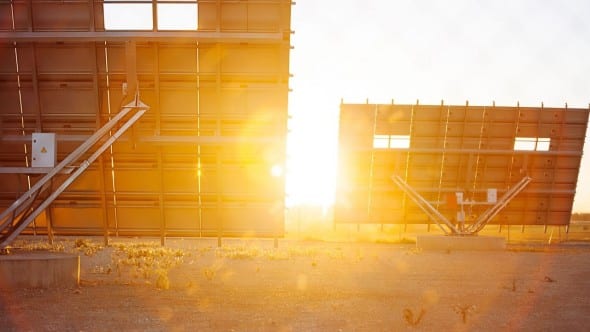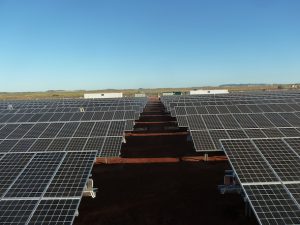The world is moving more quickly towards renewable energy than people thought even a year ago, and Australia can expect an imminent boom in large-scale solar investment, according to Grant King, the CEO of Australian energy utility Origin Energy.
King, speaking after releasing half-year results tarred by write-downs of fossil fuel investments, said the renewable energy market would be propelled by the outcome of the Paris climate agreement and the falling costs of wind and solar.
And the market might finally take off again in Australia, with King estimating that the cost of large-scale solar in the country was falling to around $80/MWh – less than half the cost of the recently completed solar farms in Broken Hill and Nyngan.
That is also below even the most optimistic predictions of the Australian Renewable Energy Agency, which is seeking solar costs below $135/MWh in its $200 million solar tender. At $80/MWh, large-scale solar would be cheaper than most gas-fired generation and, in Origin’s estimates, cheaper than wind energy (see graph below).
King said that Origin was close to pushing the go button on its Darling Downs solar farm, which at 150MW would be the biggest in Australia, although several other proposed projects would be the same size or bigger.
“We are not mucking around here,” King said. “We expect to see a lot of renewables …coming into market by 2018.” Asked if he expected to be underwriting renewable energy projects “quite soon”, King said: “Absolutely.”
Those remarks may paint a strikingly different picture of Origin Energy than that of recent years, when the company invested billions of dollars in LNG, and argued for Australia’s renewables target to be sharply reduced.
King, however, argued that to build renewables any earlier would have locked the company into higher prices. He also argued that Origin was now well placed to prosper in a changing market.
Unlike other utilities, “we are not defending legacy assets,” he said. “Solar competes with other forms of generation. We are not defending an over-generated position.”
King says the Paris climate agreement – which aspires to capping global warming at 1.5°C – has dramatically changed the outlook for the energy markets around the world, including Australia.
Much of the Australian investment in renewable energy, of course, will be driven by the federal renewable energy target, with a three-year investment drought expected to break soon.
King said he was confident that the target would be met, and that Origin would produce enough renewables to meet its obligations.
The investment stalemate has already pushed the price of renewable energy certificates to more than $80/MWh, enough to cover the cost of large-scale solar plants on King’s price estimates, even without the wholesale electricity price. (see graph above).
Some analysts predict that not enough new projects will be built to meet the RET target, and the scheme is heading towards the penalty price. King said he was confident that Origin would meet its targets.
But while King agreed renewable energy might be more economic, he also stressed that didn’t make it any quicker to build. The company still had to go through permits, planning and off-take agreement.
Origin says it is looking at both solar and large-scale wind. It is looking to sell its Stockyard Hill development in Victoria, but is looking to lock in a power purchase agreement, to meet its RET obligations, as part of that deal.
 On small-scale solar and the behind-the-meter domestic market, King said Origin aimed to reclaim the No 1 rank of solar installer that it held previously.
On small-scale solar and the behind-the-meter domestic market, King said Origin aimed to reclaim the No 1 rank of solar installer that it held previously.
Origin says it lifted solar installations by 42 per cent in the latest half to nearly 10MW. That puts it in the top three installers in the country, also competing with rival AGL Energy, which has invested in similar efforts to re-boot its rooftop solar sales.
Origin Energy is also one of the first companies to take up the Tesla Powerwall battery storage unit, and is looking at other devices too. However, King downplayed the imminent entry of Telstra into the home solar and storage market. (For more of King’s comments, click here).
King says Origin is well placed for the changing energy market because it has less investment in large, baseload fossil fuel plants (read coal) than other companies, so is less exposed to stranded assets. Its portfolio of gas-fired peaking generators should make it well placed for the increasing penetration of renewable energy.
Origin also owns the country’s biggest coal plant, Eraring, but King also argues against the push for coal-fired generators to be “paid” to exit the market as a way to reduce oversupply. “Anyone who invested in coal-fired power in the last 10 years knew what the future looks like.”
In recent years, the company’s biggest investment has been in the vast LNG export projects in Queensland. However, the slump in the price of oil – from more than $US100/barrel to around $US30/barrel – has put the economics of those projects in doubt.
 In the latest half-year, Origin slumped to a $254 million net loss after writing down the value of certain assets, including oil and gas exploration and international geothermal assets. At the operating level, gains from selling gas in the domestic market more profitably were offset by losses exploring and producing gas elsewhere.
In the latest half-year, Origin slumped to a $254 million net loss after writing down the value of certain assets, including oil and gas exploration and international geothermal assets. At the operating level, gains from selling gas in the domestic market more profitably were offset by losses exploring and producing gas elsewhere.
Origin has also been forced to implement dramatic cost cuts to lower its break-even costs, and to invest in expensive financial instruments to protect against further falls in the oil price.
But King warned that if oil prices continued to remain low, then the company may be forced to suspend its dividend payments to protect its balance sheet. “If we see relentlessly low oil prices – we may suspend dividends,” King said.
For more of King’s comments at today’s press conference, and in an interview with RenewEconomy – please click here.








